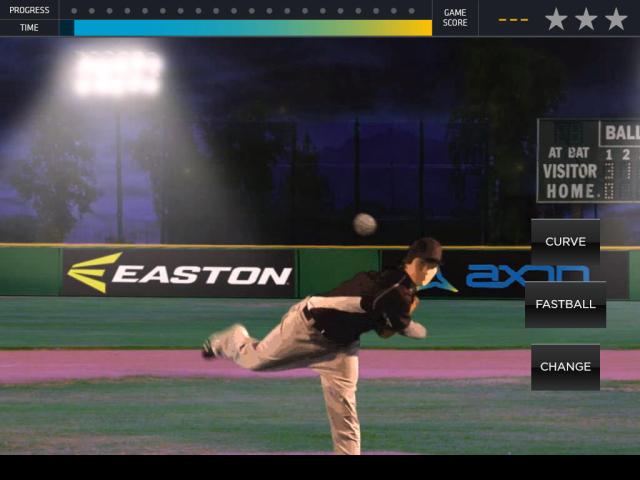
Axon Sports leads the way as a provider of sports-specific cognitive training products for athletes, providing tools that can expedite the skill acquisition process and develop cognitive fundamental skills for success. Their Elite Training systems are installed at human performance labs, training centers and college/professional team facilities throughout the United States and in the UK. These systems provide college and professional athletes advanced cognitive training tools and technology as part of a complete program for cognitive skill development.
Inside Pitch recently chatted with Axon president Jason Sada, the subject of our latest Hot Corner article:
Emergence of Axon
"About three years ago, Axon Sports was really focused on protecting the brain- identifying concussion management tools used to identify changes in cognition and tests that could measure whether the brain was still impaired after an injury. That was the first step of the process. Where we thought we could develop a lot of value was around training. We like to say in sports the 'brain matters; it must be protected and it can be trained.' That's when we set off to establish a best-in-class way to train an athlete's brain."
How much trial-and-error is involved with developing the "best" way to train the brain?
"The way we approached it really set our path as to how we do it now. We first started by really looking at the world of neuroscience and identifying what types of projects and research were being done on functional cognition, what kinds of activities were being done to assess and train high-performing brains. One thing we went into this fully aware of is that the brain is incredibly complex; the next 20 years of science and research on the brain is going to improve and identify a whole lot of things we aren't even thinking about today. We knew as well that there's functional activity and research around how the brain functions. Our goal was to identify the most immediate opportunities around how to assess and train an athlete's brain by using existing science, known science: executive function, pattern recognition, high-speed decision making. Then, we could build an architecture around the what we know about the science of the brain today.
One really important step that we took, which I would call transferability, was layering sports science on top of that. Our focus was not to develop purely cognitive assessment and training tools, but to develop those tools for specific sports. The science of every sport is significantly unique, and I would even argue the science of every position is unique. Just with the American football example, you wouldn't expect decisions, patterns, spatial recognition reasoning or anticipation skills of a quarterback to be nearly identical to a defensive tackle. They have very, very different decisions they have to make, different scenarios they're in, and different visual perspectives. Our focus was on identifying known science, coupling it with the 'known science of coaching,' if you will, and use those two to develop programs that can optimize transferability."
Teams that you work with?
"We've done a lot of work with Cal State Fullerton and the University of Oregon. We're also working on some growth sports in the U.K. with the Glaxo Smith Klein Human Performance Lab, and we're engaging teams in soccer, rugby and cricket through them."
"I think you'll find that each person takes a different perspective – on anything. What we've tried to do is understand that what we know about the brain is a marathon, and that the most significant part of what we wanted to roll out is that our solutions are not only scientifically legitimate and valid, but that they're functional. These are systems that can actually be deployed in elite sports programs. We always start at the highest end of the sport, with the most elite athletes, the most elite teams. We know that to successfully deploy a solution like this that it has to have efficacy and it has to intuitively make sense. One thing we've done to help bridge the gap between a skeptical perspective and one that got an honest appraisal was defining what we call the 'athletic brain.' When we met with these neuroscientists, we identified parameters that we thought made up an athletic brain.
What goes on in the labs?
There are two types of labs. One is a training (or human performance) facility that is focused on multiple sports; those are also the places that we'll do research out of. The others are labs that elite teams build into their own facilities. At those labs, we match the schemes the coaches are teaching so we can make sure the decisions we are training the athletes to make are consistent with the decision-making of the team – situational hitting and things like that.
I think we'll continue to see growth in human performance labs, where athletes can go and get trained and assessed. We'll also continue to grow the labs that are customized to the teams. Labs serve as a high-fidelity vehicle for athletes to engage and get the most concentrated training. The accessibility of training is also going to be portable, so athletes can continue their progress and training remotely with iPads and things like that.
We want to make available to athletes the opportunity to train their brains without taxing their bodies. One of the keys to that is ensuring that we have a high-fidelity environment where we assess, so we can identify where they need to work and what parts of their cognitive capacity they need to exercise. Then we want to compliment that with iPad and portable access. We also want to have it all linked, so that when athletes within a certain team do their repetitions, it feeds into the main system and serves as a single point of context, so that an athlete's full progression as they develop their brain is all linked and available to them wherever they are.